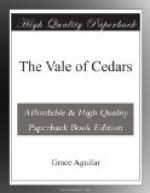The indignation of the Sovereign, and of those whom he had chosen to be present, was excited to the utmost, mingled with horror as the mysterious fates of many a loved companion were thus so fearfully solved; but none felt the recital with the same intensity of emotion as the Sub-Prior, who, with, head bowed down upon his breast, and hands tightly clenched, knelt beside the penitent. It was not indignation, it was not horror; but agony of spirit that a religion which he loved better than himself, whose purity and honor he would have so jealously guarded, that he would have sacrificed life itself for its service, should have been made the cover for such unutterable villany. Few imagined the deeds of painful mortification and bodily penance which, in his solitude, the Sub-Prior afterwards inflicted on himself; as if his individual sufferings should atone for the guilt of his brethren, and turn from them the wrath of an avenging God.
Horrible as were the details imparted, incomprehensible as it seemed that so extended and well-organized a power, should exist so secretly throughout Spain, as to hide itself even from the sovereigns and ministers of justice themselves, yet none doubted what they heard. Sovereigns and nobles well knew that the Inquisition had been established both in Castile and Arragon centuries before, and that the annals of those kingdoms, though mentioning the resistance of the people against this awful power, had been silent as to its entire extirpation.
In the first part of his narrative the man had spoken shrinkingly and fearfully, as if still in dread of vengeance on his betrayal; but his voice became bolder when he confessed his own share in the late atrocious crime. Accustomed by the strictest and most rigid training, to obey as familiars, the will of their superiors without question—to be mere mindless and feelingless tools, to whom death itself was awarded, if by word or hint, or even sign, they dared evince themselves to be as other men—he had, at the command of the Grand Inquisitor, deeply drugged Senor Stanley’s evening draught, and, while under its potent influence, had purloined his sword; waylaid Don Ferdinand in the Calle Soledad, effectually done the deed, and—aware that it would be many hours ere the English Senor could arouse himself from the stupifying effects of the draught—had intended returning to his chamber still more effectually to throw on him the suspicion of the murder. It happened, however, that it was the first time he had ever been chosen by his superiors as their tool for actual murder, and the magnitude of the crime, from the greatness of, and universal love borne towards the victim, had so appalled him, that, combined with the raging storm and pitchy darkness, he had felt utterly bewildered. Not well acquainted with Segovia, he had found himself, after more than an hour’s wandering—instead of, as he expected, again near the Senor’s lodgings—in the self-same spot whence he had started, and close




